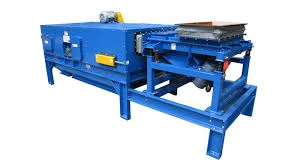

Dec . 15, 2024 12:06 Back to list
Understanding the Prices of Industrial Shredding Machines
In today's rapidly evolving industrial landscape, the need for efficient waste management solutions has become more pressing than ever. Industrial shredding machines play a crucial role in recycling processes, waste management, and even in the manufacturing industry by transforming large volumes of material into manageable sizes. However, one of the key concerns for businesses looking to invest in such equipment is the price. Understanding what affects the price of industrial shredding machines is vital for making informed purchasing decisions.
Factors Influencing Price
1. Machine Type Industrial shredders come in various types, including single-shaft, double-shaft, and granulators. Each type is designed for different applications, which can significantly impact the price. For example, single-shaft shredders tend to be more economical but may not be suitable for tougher materials. In contrast, double-shaft shredders, which are better for heavy-duty materials, generally come at a higher price point.
2. Capacity and Throughput The capacity of an industrial shredder, measured in tons per hour, will also affect its price. Machines designed to handle larger volumes of materials typically cost more due to their robust construction and advanced technology. Companies need to assess their requirements to ensure they choose a machine that matches their processing needs without overspending.
3. Material Compatibility The types of materials a shredder can process are crucial. Heavy-duty machines capable of handling metals, plastics, and textiles will cost more than those that are designed for lighter materials. Companies that need to shred a wide variety of materials should be prepared to invest in a more versatile and therefore more expensive machine.
4. Brand Reputation The manufacturer's reputation can greatly influence price. Established brands that have a track record of reliability, performance, and customer service often command higher prices. While it might be tempting to opt for cheaper options from lesser-known brands, it is essential to consider the long-term value and potential hidden costs associated with lower quality.

5. Technological Features Modern shredders often come equipped with advanced technologies such as automation, energy efficiency features, and integrated control systems. These features can enhance productivity and reduce operational costs, but they also contribute to a higher upfront price. It’s important for businesses to carefully analyze which features they truly need and which might be unnecessary luxuries.
6. Customizations and Add-Ons Many companies offer customizable shredding solutions tailored to specific industry needs. While customization can improve efficiency, it can also significantly increase the final price. Businesses should evaluate whether the benefits of custom features justify their costs.
7. Maintenance and Operational Costs The initial purchase price is only one part of the equation. Ongoing maintenance and operating costs, including the availability of spare parts and servicing, can add up. Investing in a machine with lower operational costs might be more beneficial in the long run, despite a higher initial investment.
Average Price Ranges
The price of industrial shredding machines can vary widely based on the factors mentioned above. Generally, small and less complex shredders may start around $5,000, while mid-range machines can cost anywhere from $20,000 to $100,000. High-end, heavy-duty machines that are capable of processing tough materials can exceed $100,000, with some unique, customized models potentially reaching several hundred thousand dollars.
Conclusion
Investing in an industrial shredding machine requires careful consideration of various factors that influence price. Companies need to assess their specific needs, the types of materials they will be processing, and their budget to make an informed choice. While it may be tempting to go for the least expensive option, it is often more prudent to invest in quality machinery that will provide reliability and efficiency over time. The right shredder can enhance operational efficiency, reduce waste disposal costs, and contribute positively to a company’s bottom line.
Latest news
Troubleshooting Common Eddy Separator Problems
NewsJul.04,2025
The Role of Metal Recycling Plants in Circular Economy
NewsJul.04,2025
The Impact of Recycling Line Pickers on Waste Management Costs
NewsJul.04,2025
Safety Features Every Metal Shredder Should Have
NewsJul.04,2025
How Industrial Shredders Improve Waste Management Systems
NewsJul.04,2025
How Cable Granulators Contribute to Sustainable Recycling
NewsJul.04,2025